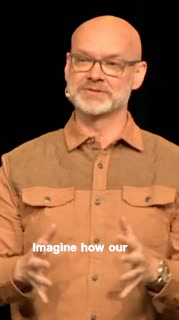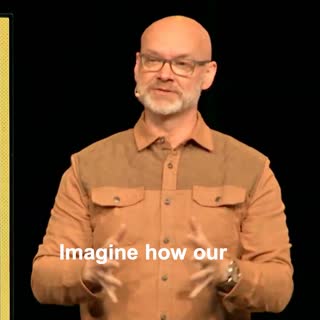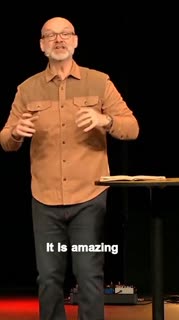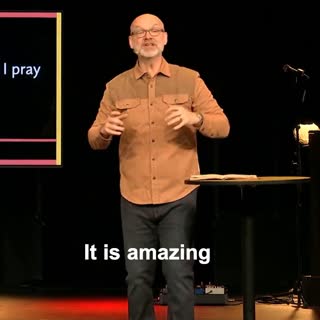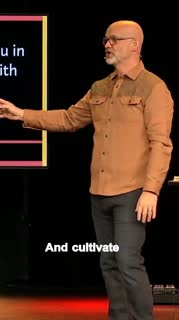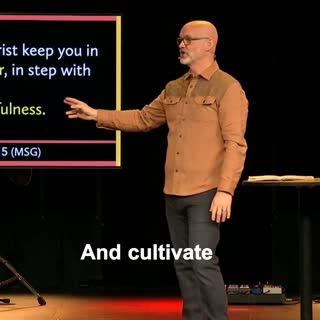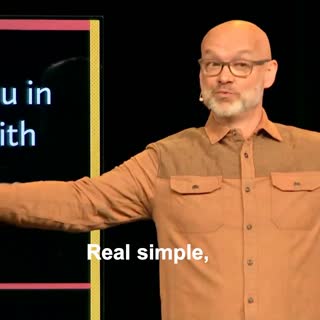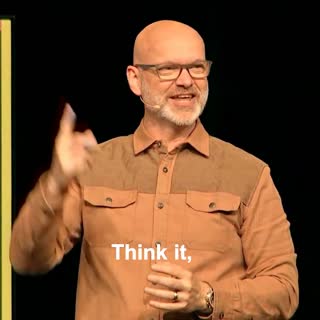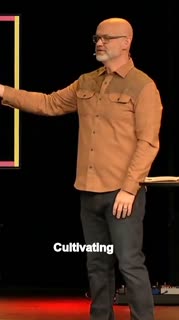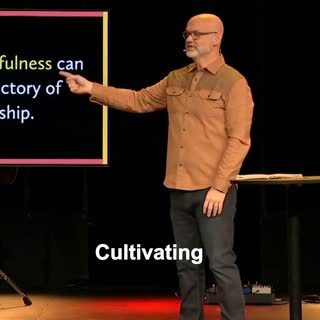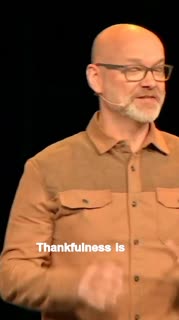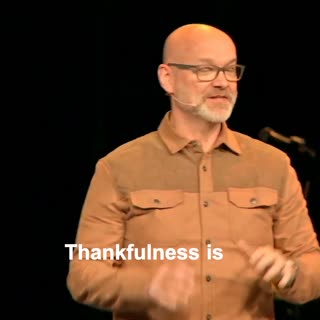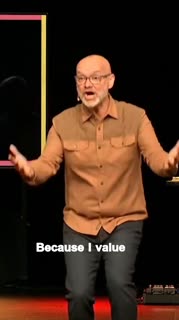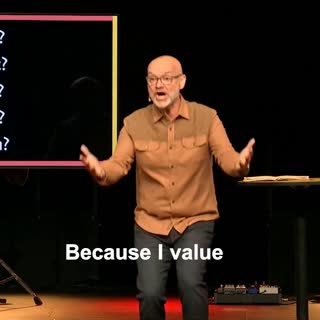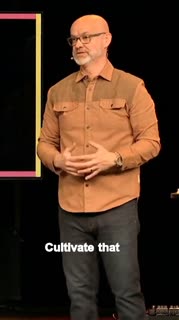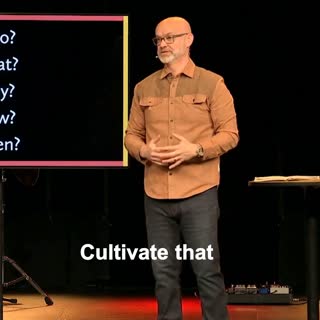Transforming Relationships Through the Power of Gratitude
Devotional
Sermon Summary
Bible Study Guide
Sermon Clips
"Imagine how our Heavenly Father must feel when we communicate thankfulness to one another. You see, God does so much in our lives through other people. In fact, some of the greatest things and biggest things God's doing in your life, He's doing through others. His work in your life often comes through other people. And so when we thank each other for what we do for each other and who we are in each other's lives, friends, families, and as we will see, even foes, that is our way of also acknowledging God's work in our lives through them. And so God is honored and God is glorified when we honor one another with the simplicity and the power, the power of a thank you. And it'll help. It'll help so much in your relationships, I'm telling you." [00:36:30] (58 seconds)
"It is amazing the effect, the cumulative effect that can have in a relationship when we are communicating thankfulness in that kind of way. And Paul, he didn't just do it himself. He turns it on us and says, as followers of Jesus, you need to treat each other this way. Now, this is true for everybody. Whether you're a Jesus follower or not, whether you consider yourself a Christian or not, it doesn't matter. What we're getting ready to talk about will work for 100 % of you here." [00:41:13] (33 seconds)
"And cultivate thankfulness with each other. See, that's the context. He's talking about how we treat each other, and he says, I want you to cultivate thankfulness with each other. Cultivate is an agricultural word. It's a farming, a gardening, a gardening word that we understand in the context of cultivating soil, cultivating ground, working ground, so that it produces awesome stuff. You know this in gardening. You have to cultivate the ground, cultivate it, work the ground, get it ready, prep, and then care for it." [00:44:24] (39 seconds)
"Real simple, but it's not easy. Real simple. You know this. Here's how you do it. Here's how you cultivate thankfulness. You think it, you say it, and you show it. With that friend, with that family member, even with that foe, you think it, you say it, and you show it. When you think it, you acknowledge the fact that we all know that gratitude is an attitude. I didn't coin that phrase. I don't know where it came up, but just one of the things that we know. Gratitude is an attitude. An attitude of gratitude. And because gratitude is an attitude, that means you can choose it." [00:44:24] (35 seconds)
"Think it, because that's where it begins. And then say it, and then illustrate it with your actions. Years ago, many years ago now, I've forgotten how many years, but it's been a long time, Dr. Gary Chapman, who lives locally here in the Triad, wrote a book. No doubt his most famous book. And even if you're not a Christian and been in church circles, you're probably familiar with this or have heard somebody talk about this. I hear comedians talk about it. And it's fantastic stuff. It's called The Five Love Languages." [00:51:10] (31 seconds)
"Cultivating thankfulness can actually change the trajectory of the entire relationship. Thankfulness is so powerful, it can actually begin to turn the relationship back into a healthier direction. No, it doesn't fix everything. It doesn't mean there's not issues that need to be worked through. It doesn't mean there won't be difficult conversations that need to be had. But I've seen it. I've experienced it and I've seen it happen time and time and time again. How cultivating thankfulness, communicating it, thinking it, saying it and showing it can actually begin to change the direction and the dynamic of the entire relationship to a much healthier situation." [00:55:17] (42 seconds)
"Thankfulness is a powerful thing. It can be healing, even energizing. I mean, it's so energizing to be seen and valued. It can be the entry point to reconciliation. Maybe there's a broken relationship. Often the entry point to healing that and reconciling what needs to be put back together is cultivating thankfulness." [00:57:35] (27 seconds)
"Because I value that, because we value each other, because we want to make this intentional, we write it down. Here's the deal. We know this. We automate the things that are important in our lives, don't we? You automate important things. Ask your mortgage company. Ask the people you pay rent to. They'll tell you. That payment is so important, we're going to automate it. You don't even get a choice. Give us your bank routing number and all that kind of stuff, and it's just going to come out. Right? Because you automate the important. Having a roof over your heads is a pretty big deal." [01:02:18] (32 seconds)
"Cultivate that relationship soil with thinking, saying, and showing thankfulness. You might be surprised how it changes the trajectory of the entire relationship. It changes the environment. It changes the dynamic. It's not going to be perfect. You're not going to do it perfectly. But never underestimate the power of a simple, well-communicated, well-thought-out thank you." [01:06:50] (32 seconds)
Ask a question about this sermon
"It is amazing the effect, the cumulative effect that can have in a relationship when we are communicating thankfulness in that kind of way. And Paul, he didn't just do it himself. He turns it on us and says, as followers of Jesus, you need to treat each other this way. Now, this is true for everybody. Whether you're a Jesus follower or not, whether you consider yourself a Christian or not, it doesn't matter. What we're getting ready to talk about will work for 100 % of you here." [00:41:13] (33 seconds)
"And cultivate thankfulness with each other. See, that's the context. He's talking about how we treat each other, and he says, I want you to cultivate thankfulness with each other. Cultivate is an agricultural word. It's a farming, a gardening, a gardening word that we understand in the context of cultivating soil, cultivating ground, working ground, so that it produces awesome stuff. You know this in gardening. You have to cultivate the ground, cultivate it, work the ground, get it ready, prep, and then care for it." [00:44:24] (39 seconds)
"Real simple, but it's not easy. Real simple. You know this. Here's how you do it. Here's how you cultivate thankfulness. You think it, you say it, and you show it. With that friend, with that family member, even with that foe, you think it, you say it, and you show it. When you think it, you acknowledge the fact that we all know that gratitude is an attitude. I didn't coin that phrase. I don't know where it came up, but just one of the things that we know. Gratitude is an attitude. An attitude of gratitude. And because gratitude is an attitude, that means you can choose it." [00:44:24] (35 seconds)
"Think it, because that's where it begins. And then say it, and then illustrate it with your actions. Years ago, many years ago now, I've forgotten how many years, but it's been a long time, Dr. Gary Chapman, who lives locally here in the Triad, wrote a book. No doubt his most famous book. And even if you're not a Christian and been in church circles, you're probably familiar with this or have heard somebody talk about this. I hear comedians talk about it. And it's fantastic stuff. It's called The Five Love Languages." [00:51:10] (31 seconds)
"Cultivating thankfulness can actually change the trajectory of the entire relationship. Thankfulness is so powerful, it can actually begin to turn the relationship back into a healthier direction. No, it doesn't fix everything. It doesn't mean there's not issues that need to be worked through. It doesn't mean there won't be difficult conversations that need to be had. But I've seen it. I've experienced it and I've seen it happen time and time and time again. How cultivating thankfulness, communicating it, thinking it, saying it and showing it can actually begin to change the direction and the dynamic of the entire relationship to a much healthier situation." [00:55:17] (42 seconds)
"Thankfulness is a powerful thing. It can be healing, even energizing. I mean, it's so energizing to be seen and valued. It can be the entry point to reconciliation. Maybe there's a broken relationship. Often the entry point to healing that and reconciling what needs to be put back together is cultivating thankfulness." [00:57:35] (27 seconds)
"Because I value that, because we value each other, because we want to make this intentional, we write it down. Here's the deal. We know this. We automate the things that are important in our lives, don't we? You automate important things. Ask your mortgage company. Ask the people you pay rent to. They'll tell you. That payment is so important, we're going to automate it. You don't even get a choice. Give us your bank routing number and all that kind of stuff, and it's just going to come out. Right? Because you automate the important. Having a roof over your heads is a pretty big deal." [01:02:18] (32 seconds)
"Cultivate that relationship soil with thinking, saying, and showing thankfulness. You might be surprised how it changes the trajectory of the entire relationship. It changes the environment. It changes the dynamic. It's not going to be perfect. You're not going to do it perfectly. But never underestimate the power of a simple, well-communicated, well-thought-out thank you." [01:06:50] (32 seconds)
